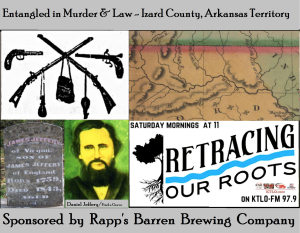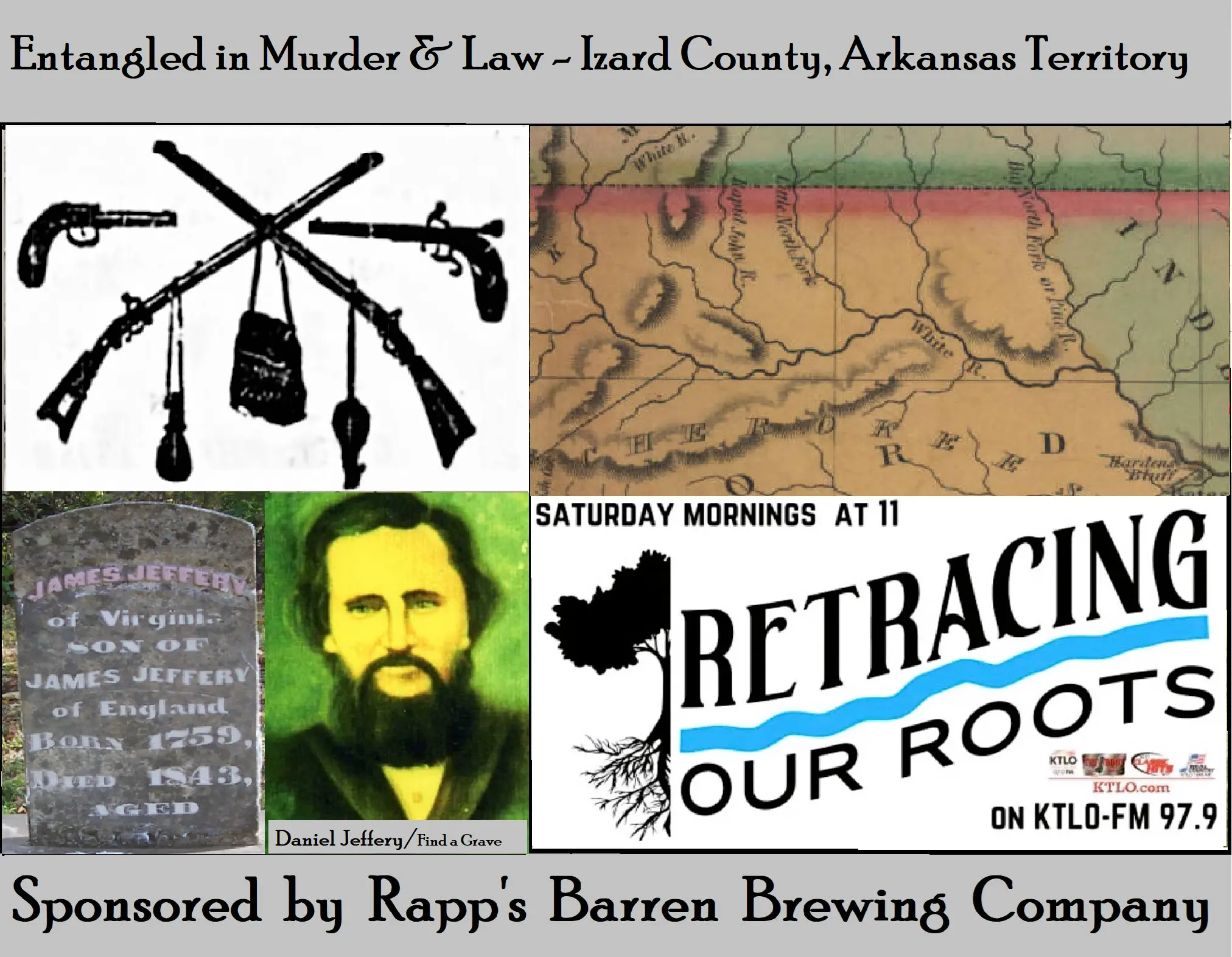
ROR: Entangled in Murder and Law in Izard County, Arkansas Territory
Welcome to Retracing Our Roots as Sammy Raycraft and Vincent Anderson journey back to the early 1800s in the Arkansas Territory along the White River in what is now present-day Izard County. We find the Trimble family carving out their place in this rugged land, while their neighbors, the Jeffery clan, became entangled in violence, accusation, and the courts of a young Arkansas Territory.
The Murder of Bill Trimble, 1811
Let’s step back to the year 1811. A band of settlers made their way from Kentucky and the Carolinas into the wild valley of the White River. Among them were the Trimble brothers—Wat, Bob, John, Jo, Jim, and Bill—along with the Ramseys, the Hawthorns, and Lewis Partee. They were some of the very first white settlers in what would become Izard and Baxter counties.
The boldest of the lot was said to be Bill Trimble. And it was his daring, and perhaps his reckless ways, that made him a marked man.
Following close behind, all the way from Kentucky, came another man known only as Grant, which was probably an alias. Grant disguised himself, gained Trimble’s trust, and even struck up a hunting trip with him down the White River.
On their first day out, they stopped for dinner at the Hawthorn cabin, just below what we now call Calico Rock. While there, old Mrs. Hawthorn, a woman of deep faith and superstition, warned Bill. She said she had dreamed of an owl perched on a great stone, and when she drew close, the owl turned into Bill himself. It was an omen of death.
Trimble laughed it off. He’d been drinking, and Grant pretended to keep pace. That night, they stayed at the home of two Carter women. After dark, Grant staggered outside, acting drunk, and swore he was leaving. Trimble coaxed him back inside. But soon Grant tried again, as he started slipping out with Trimble’s gun in his hand. When Bill followed him to the door, Grant wheeled and shot him dead with his own rifle.
The women screamed, but Grant returned to calm them. Grant claimed Trimble had abused his wife back in Kentucky. He even mocked the dead man’s rifle, which Bill had nicknamed “Sweet Lips.” Grant said, “Sweet Lips has spoken a big word, and Jack of Diamonds,” Grant’s own rifle, “will speak another soon.”
Bill Trimble was buried near the very spot Mrs. Hawthorn had seen in her dream, a stone where the owl had landed. The story goes that “Sweet Lips,” the rifle, lingered for years as a grim relic of Izard County.
Grant wasn’t finished. He drifted downriver and stopped at the home of Wat Trimble, Bill’s brother, who lay sick and dying. Grant announced he had killed Bill and had come to kill Wat too—but seeing disease was doing the work, he spared him. He climbed back in his canoe and was never seen again on the White River.
But the story didn’t end there. Reports in the Arkansas Gazette claimed Grant robbed Bill’s saddle bags of six hundred dollars in cash, a fine brown coat, and left carrying his neat, small-bored rifle. The paper described him as about forty-five years old, slender, dark-complexioned, gray-headed, and surprisingly refined in conversation. He had once held commissions as both major and colonel. They warned he was a dangerous man, already admitting to other killings back east.
No one was ever tried for the murder of Bill Trimble. Grant vanished, likely changing his name, perhaps slipping toward the Red River country or the territorial line.
The tale of Bill Trimble reminds us that frontier Arkansas was as rough and lawless as any stretch of the early American West. Dreams, superstition, murder, and stolen money, all playing out on the White River long before towns or courthouses came to tame it.
Tangles, Trials, and the Jeffery Men - 1826
In the fall of 1826, the Arkansas Gazette reported one of the most sensational murder trials of territorial Arkansas. At the center were three men: Jesse Jeffery Jr., his brother Daniel, and their father, James “Old Jim” Jeffery. All three men stood accused of killing William Henderson of of current day Izard County.
The story began a year earlier, in October of 1825. Jonas Williams, a deputy, claimed he held a civil warrant against Henderson for assault and battery. To serve it, he summoned the Jeffery men to ride with him. Reluctantly, they agreed. When they arrived at Henderson’s property, the tension was immediate. Henderson warned them not to cross his fence, saying he would “blow a hole through the first man who tried.”
Despite the warning, Jesse Jr. crossed Henderson’s fence, and fierce words were exchanged. Henderson raised his rifle, and in the scuffle that followed, Old Jim Jeffery batted the weapon down with his cane. But the chaos escalated. Daniel handed Jesse Jr. a gun, and in that fateful moment, Jesse fired, striking Henderson dead.
At trial, the witnesses could not agree. William Gibson, testifying for the prosecution, described Jesse Jr. as the aggressor. But Jonas Williams and others insisted Henderson meant to shoot Old Jim, and Jesse acted only to save his father’s life. The jury weighed the evidence and found Jesse Jr. guilty of manslaughter.
But the case didn’t end there. Days later, Daniel and Old Jim were tried on the same indictment. Suddenly, the prosecution’s star witness, Gibson, changed his story—claiming Henderson had snapped his gun at the Jefferys with intent to fire. When asked why he hadn’t mentioned that before, he replied simply, “I had forgotten it.” The defense seized on this, arguing Gibson could not be trusted. The jury needed little convincing. Daniel and Old Jim were acquitted on the spot.
With their acquittal, Jesse’s conviction collapsed. The court granted him a new trial and ultimately released him. All three Jefferys walked free.
It wasn’t just a courtroom drama; it was a showcase of frontier justice. The Jefferys’ defense was led by some of the most powerful names in Arkansas history: Dickinson, Sevier, Oden, Ashley, and Crittenden. These attorneys would later rise to shape the politics of this young Arkansas Territory.
The Henderson-Jeffery affair reveals a lot about life in early Arkansas: property disputes that turned deadly, neighbors deputized into law, and courts swayed by who could tell the better story. In the end, William Henderson lay dead, but the Jefferys went home waiting for court to weigh on their guilt or innocence. It was living proof that in territorial Arkansas, justice was anything but simple.
------
As the story of the Trimble family reminds us, carving out a life in the Arkansas Territory meant both grit and danger. The Jeffery men’s tangle with the law shows how quickly survival and suspicion could spill into violence and trial in a land still finding its footing. These early families left more than cabins and fields, they left stories, tangled with justice, memory, and legend, that still echo along the White River today.
𝗧𝗵𝗮𝗻𝗸 𝘆𝗼𝘂, 𝗥𝗮𝗽𝗽’𝘀 𝗕𝗮𝗿𝗿𝗲𝗻 𝗕𝗿𝗲𝘄𝗶𝗻𝗴 𝗖𝗼𝗺𝗽𝗮𝗻𝘆!
A big thank you to our friends at Rapp’s Barren Brewing Company, and congratulations on your recent 8-year Anniversary. Their ongoing support is what helps 𝙍𝙚𝙩𝙧𝙖𝙘𝙞𝙣𝙜 𝙊𝙪𝙧 𝙍𝙤𝙤𝙩𝙨 echo through the hills with the true stories of the Ozarks, stories you will not find in the average history book. It is partnerships like theirs that keep our heritage alive, one story at a time.
Next time you are in downtown Mountain Home, stop by Rapp’s and thank Russell Tucker and his incredible team. They are helping preserve local history with heart and hometown pride.
Sip. Savor. Sojourn.
𝙍𝙚𝙩𝙧𝙖𝙘𝙞𝙣𝙜 𝙊𝙪𝙧 𝙍𝙤𝙤𝙩𝙨











